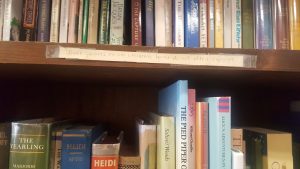Upon meeting the collections of rare and used books organized in DJ Ernst Books, in a sense, one is also meeting the owner himself. The shop is packed and overflowing with books, so much so that the paperbacks are stacked in rows on the floor along the bookshelves that line the store walls. More than that, a visitor first meets the display at the center of the shop, stacked with a mix of antique, leather-bound tomes about history, and more modern books about rivers and nature. The lack of labels here forces you to examine this center island and find a pattern for yourself, to decode the mind of the bookseller and why he organized those specific books together. To the immediate left of the entrance is a small rack of inexpensive greeting cards that I did not notice the first or the second time I visited the store. The vast array of books from many different time periods packed into this small, homey, and well-lit store completely distracted from that aspect of the shop’s products.

Along the walls, there is no shortage of signs, pictures, illustrations, and genre labels on the shelves. One is met with an almost overwhelming array of knowledge and literature. To the left begins the history books, one of the most common genres here in DJ Ernst. Instead of dedicating one section of the store entirely to history, the owner creates subsections of specific kinds of histories and mixes them with many other genres. On the left side of the shop, illustrated children’s books are right next to books about ancient history, as well as the Civil War and Pennsylvanian history. DJ Ernst’s Books has a wide collection of literature about history, as well as antique books that fall under that umbrella because of their age. Perhaps the owner split this particular genre across the entire store because he would rather not dissuade any customers who might not particularly enjoy or be interested in older subjects. If the left side of the shop was dedicated solely to history it would be very easy to ignore one half of the bookshop’s experience because of disinterest, or lack of previous exposure to the subject.
On the right side of the shop, history continues, along with poetry, and even a section just for books autographed by the author. Most notably, there are also sections for books about hunting, fishing, and the outdoors. If you are from the town of Selinsgrove, from the local area in general, or a town very similar to it, this will feel familiar to you. It might feel like this collection was made just for you, which in many ways is true; a bookstore’s collection oftentimes reflects the community, especially if it’s DJ Ernst Books, whose owner is very ingrained in the community around him.
Up ahead towards the back of the store and right across from the cashier’s counter is even an entire bookshelf sectioned off for more paperbacks, each for one dollar. Almost all of the bookshelves in the main area of the store have three rows of paperbacks lined up on the floors, and up front are even more. Most of the paperbacks are novels, such as science fiction novels or other creative works. None have expensive binding or those that would be considered rare and antique, in contrast to the center of the store, as well as everywhere else, that gives the beautiful and historical books a proper pedestal to placed upon.
Additionally, what may be hard to miss are the countless instructions and warnings scrawled on older, yellowed slips of paper that are taped almost everywhere you look. All are messages from the owner to his customers to take care of his books. Some say messages along the lines of “handle with care,” others more descriptive warnings such as “treat older books as if they were glass,” or “dust jackets on children’s book do not often survive.” If it was not clear before that the owner of DJ Ernst cares about his books and regards them as special kinds of object, it is more than clear now.

In the back, beyond the view of the customer, is a section dedicated to extremely rare books. One would think that storing product outside of the customer’s view would be counterproductive to sales, especially considering that so far the shop is full to the brim with product and wants to remind you of just how much is in here. However, considering the mind of the bookseller himself, it makes perfect sense. DJ Ernst Books is very much a personal bookstore, which more so than anything else reflects the interests, tastes, and preferences the owner has for literature.
If we begin to think of the collections of books in the store as the owner’s personal collection he is willing to share with customers, the decisions made about the interior of the store begin to fall into place. In “On Collecting Art and Culture,” Clifford says that collection is “accumulation of possessions, the idea that identity is a kind of wealth” (218). DJ Ernst is not someone who thinks of the book as only a product or an object for profit, instead, it is the collection of interesting and important books apart of his identity that is valuable to him. The owner is clearly someone who cares about the aesthetic and historical value of the book. He elevates the expensive and rare book to its own sections at the top of shelves, not simply for the fact that they are expensive, but because they are well made and have important value. He eagerly discusses the different kinds of interesting and unique ways of binding and design; he is clearly someone who thinks of the book as its own expression of art in both the content and the material in which it is presented. The fact that so many of the books are historical also reflect the owner’s deep interest in older objects, older time periods, and the aesthetic value that comes with those time periods.
Works Cited
Pictures
All pictures courtesty of Eneida Giboyeaux
Text
“On Collecting Art and Culture.” The Predicament of Culture: Twentieth-Century Ethnography, Literature, and Art, by James Clifford, Harvard University Press, 2002, pp. 215–250.
Map
Created with www.thinglink.com

0 Comments